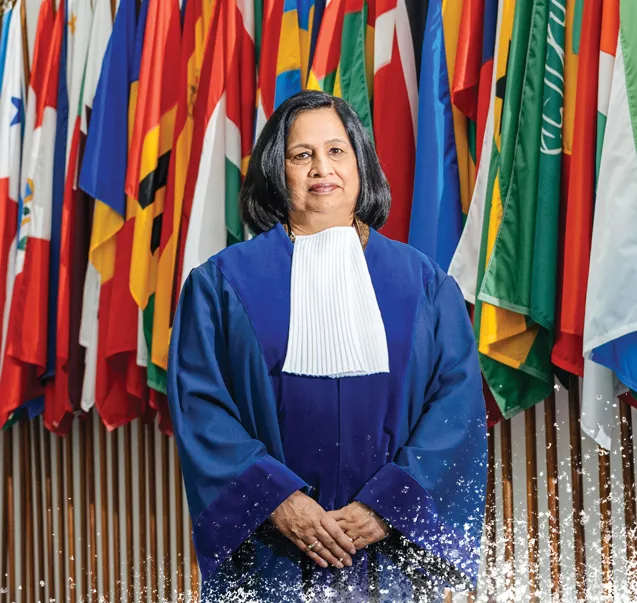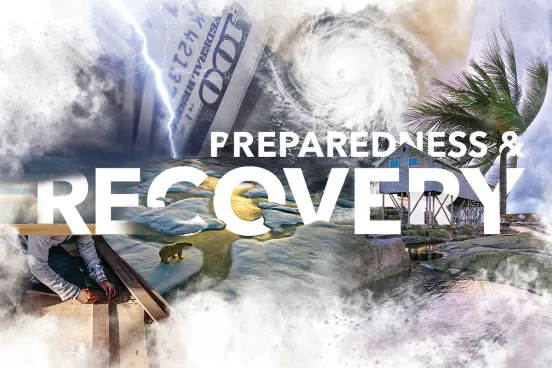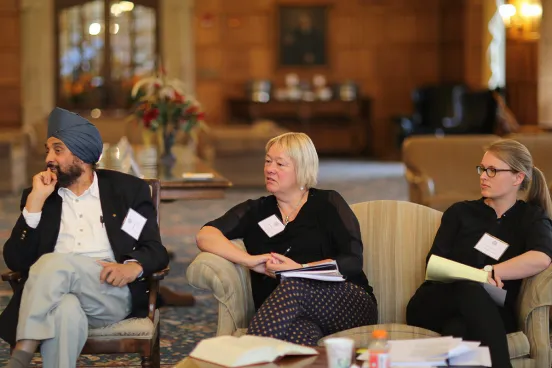
For most of her law career, Neeru Chadha, LLM ’85, served as a legal adviser in relative anonymity in the Ministry of External Affairs in her native India—despite having represented her home country not only in the United Nations, but also on the global stage in disputes with Italy, Bangladesh, and the Marshall Islands.
But in June 2017, Chadha became the first Indian woman (and second female from any country) elected to the International Tribunal for the Law of the Sea (ITLOS)—the Hamburg-based UN judicial body that was established in 1994 to settle maritime disputes worldwide. She was anonymous no more.
Back home, her election was trumpeted by one top national newspaper as “a significant victory for India at the UN,” and another declared it a “significant win for Indian women.” It was the second cracked glass ceiling for Chadha; in 2011, she became the first woman chief legal adviser to India’s Ministry of External Affairs.
Despite the dizzying heights of her achievements, Chadha says her formula for success is quite down-to-earth. “My only mantra has been hard work, keeping up to date in my area of expertise, and doing my job with sincerity and to the best of my ability,” she says.
Chadha’s experience in arbitration and litigation cases is extensive, and she credits Michigan Law with stoking her interest in legal research. She already had a law degree from the University of Delhi when she decided to come to Ann Arbor. Some of her professors in India had studied law in the United States and talked about those experiences in class. It made her want to “study in America for a short period to experience the teaching methods adopted by U.S. law schools,” she says.
The “well-equipped” library at Michigan Law and online resources such as Westlaw and Nexis—not available in India at the time—“showed me the vast potential in the field of legal research and encouraged me to pursue it and the field of law further,” Chadha says.
After graduating from Michigan Law, she returned to India and the University of Delhi for her PhD. Prior to her election to ITLOS, she spent most of her career with the ministry in various roles, including as legal adviser to the Permanent Mission of India to the UN in New York.
She also represented India at the International Court of Justice when the Marshall Islands accused the country (along with Pakistan and the United Kingdom) of not taking steps to end the nuclear arms race. Earlier, she defended India in an Annex VII Arbitration in the Permanent Court of Arbitration in a maritime boundary dispute in the Bay of Bengal with Bangladesh.
And she was the lead agent in a high-profile 2012 case of two Italian marines accused of shooting two Indian fishermen in international waters off the coast of India, whom they mistook for pirates. Indian authorities arrested the two marines, setting off a tense diplomatic standoff between the two countries, which included proceedings in front of some of her future colleagues—the judges of ITLOS.
ITLOS, which has judges representing all regions of the world, including Africa, Asia, Eastern and Western Europe, and Latin America and the Caribbean, has jurisdiction over any dispute that involves the interpretation or application of the UN Convention on the Law of the Sea. The tribunal currently is hearing, for instance, a dispute between Panama and Italy regarding the arrest and detention of a Panamanian-flagged vessel that refuels yachts in international waters.
One issue that Chadha believes will become more prominent is how climate change will impact the law of the sea. Studies show that sea levels have been rising over the past 100 years. In 2016, the global sea level was 3.2 inches above the 1993 average, which was the highest annual average in the satellite record (from 1993 to present), according to an American Meteorological Society report. The level continues to rise at a rate of just over one-eighth of an inch per year, according to the report, due to a combination of melting glaciers and ice sheets, and thermal expansion of seawater as it warms.
Chadha says the oceans play a critical role in regulating the earth’s climate, as they absorb the extra energy trapped in the climate system as well as a large amount of the carbon waste that is emitted into the atmosphere. As a consequence, the oceans are warming and expanding and their chemical composition is changing, which leads to sea level rise and ocean acidification. Both have an adverse effect on the marine ecosystem and biodiversity.
A recent report from the UN secretary general states, “the results of these effects include loss of life, destruction of property, erosion of coastlines, migration of fish stocks, coral bleaching, and other ecosystem degradation. These impacts act as threat multipliers by combining with other anthropogenic impacts, thus exacerbating challenges relating to food security, livelihoods, and the development of communities.”
Sea level rise, depending on the extent, is expected to be the most serious consequence of climate change, posing a risk to all the coastal states, Chadha says. Its effects could range from erosion of coastlines to loss of territory for some low-lying states.
“From the law of the sea perspective, this will have a direct impact on ‘baselines’ that may either retreat or lose base points that are established on low-tide elevations or islands,” she says. “This will impact the breadth of the maritime zones because the extent of maritime zones is determined from these baselines. For many coastal states, some studies indicate these shifting baselines not only will result in loss of entitlement to maritime zones, but also a loss of critical maritime area as their outer limits will move landwards. For some island states, the fear is it could radically reduce or eliminate entirely their maritime entitlements,” Chadha says.
The loss of maritime zones and the resulting reduction in available resources is expected to have huge economic consequences for coastal states. “Shifting baselines also will change maritime boundaries, create uncertainty, and, hence, give rise to new challenges not only under the Law of the Sea Convention but also international law in general,” Chadha says.
While she anticipates that her nine-year term on the tribunal will be a busy one, Chadha embraces the challenge. To succeed in any field, “there are no shortcuts, and there is no substitute for hard work and total dedication,” she says. “This is the advice I give to all my young colleagues and other young people with whom I have had the opportunity to interact.
“With regard to being a role model, I will be glad if young women view my success as an example of ‘all doors open and no glass ceiling.’”







